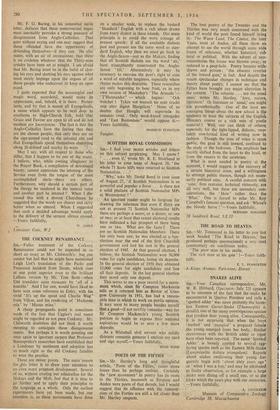POETS OF THE FIFTIES SIR,—Mr. Hartley's long and thoughtful article,
' Poets of the Fifties,' raises more issues than he perhaps realises. Certainly the ' new movement' in poetry has its roots in the Thirties, inasmuch as Empson and Auden were poets of that decade, but I would suggest that its affinities with the romanti- cism of the Forties are still a lot closer than Mr. Hartley suspects.
The best poetry of the Twenties and the
Thirties was very much concerned with the kind of world the poet found himself living in: The Waste. Land, The Cantos, the later Yeats, most of Auden, all these show an attempt to see the world through some wide frame of reference, whether historical, Cu!'. tural or political. With the advent of neo• romanticism the, frame was throWn away, or reduced to a peep-hole. Poetry became with.
drawn and private: ' the obscure reveries
of the inward gaze,' in fact. And despite the recent spectacular changes in technique and theory about poetry, I cannot see that the Fifties have brought any major alteration in the content. ' The subjects . . . are the usual ones,' writes Mr. Hartley, love, nature, literature.' (Is literature so usual,' one might ask parenthetically. One of the least en. couraging things about the new school is the tendency to treat the subjects of the English Honours course as a rich vein of poetio material.) Well, one can think of others( especially for the tight-lipped, didactic, reso• lutely non-lyrical kind of writing now in fashion. Though the tone of voice is more public, the gaze iS still inward, confined to the study or the bedroom. The emphasis hat merely shifted from the heart to the head, or from the viscera to the cerebrum.
What is most needed in poetry at the moment, I would suggest, is the recovery of a certain historical sense, and a willingness to attempt public themes, though not neces- sarily political ones. A careful concern with ' tone,' firm restraint. technical virtuosity, are all very well, but these are secondary con• siderations, the ' How' rather than the ' What.' One is forced to echo Mr. Roy Campbell's famous question, and ask ' Where's the bloody horse ? '—Yours faithfully,


































 Previous page
Previous page